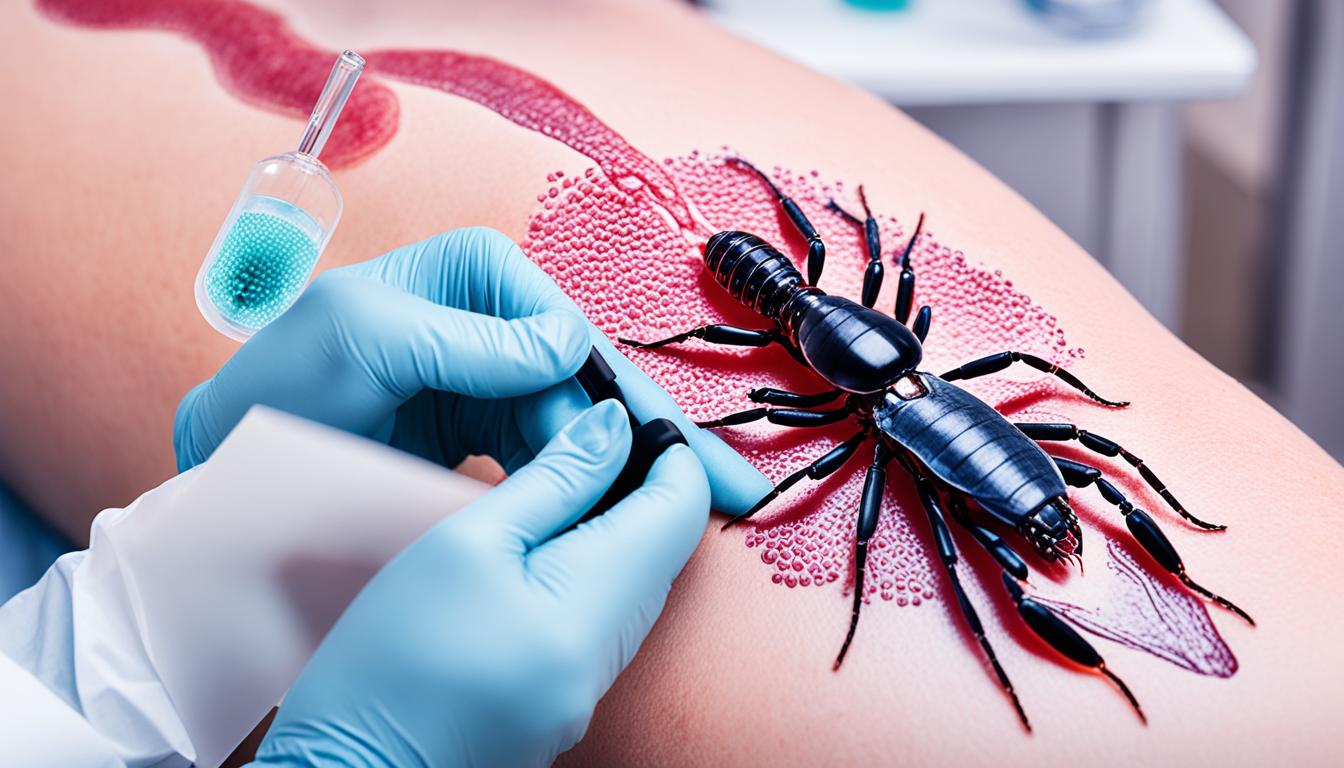Scorpion envenomation is a life-threatening emergency that clips certain hot spots in Africa, India, and Latin America. The venom affects ion channels, causing serious symptoms. These can affect the heart, lungs, blood, kidneys, and brain.
Kids are at higher risk from scorpion venom. Symptoms include pain and tingling, muscle spasms, sweat, and high blood pressure. Quick treatment is key. It involves antivenom, support for body functions, and acting fast.
Preventive measures are the best defense. But understanding treatment is crucial too. We’ll look into symptoms, causes, diagnosis, and novel treatments like stem cells in this piece.
Key Takeaways:
- Scorpion stings are a big deal needing quick treatment.
- The venom messes with ion channels, causing diverse symptoms.
- Kids often feel the worst effects of scorpion stings.
- Swift, spot-on treatment is key for a good recovery.
- Stem cell therapy is a hopeful future treatment for scorpion stings.
Keep reading to become well-versed in scorpion stings. We’ll cover more about symptoms, causes, and how they’re treated.
Scorpion Envenomation Epidemiology and Pathophysiology
Scorpion envenomation causes a serious health issue, affecting over a million people each year. This problem is worse in warm months and rural areas. Scorpions are most active in these places.
The venom of a scorpion has parts that can dissolve in water. These parts affect ion channels. This leads to the start of inflammation and harm to nerve cells.
Getting stung by a scorpion can show different symptoms. This depends on what kind of scorpion it is and how much venom enters the body. It might just hurt a little with some swelling. But a really bad case can stop your heart, make you unable to breathe, or cause brain issues. Scorpion venom can also lead to blood clots, problems with blood not clotting, and kidney issues.
Understanding the big picture of scorpion stings is key to treating it right. By looking at how venom affects the whole body, we find better ways to fight against scorpion stings.
Key Points:
- Scorpion envenomation is a significant public health concern globally.
- Scorpion venom contains water-soluble polypeptides with enzymatic and pro-inflammatory properties.
- Toxins in scorpion venom affect voltage-gated ion channels, resulting in the release of inflammatory mediators and neuronal damage.
- Clinical manifestations range from mild symptoms to severe cardiovascular collapse, respiratory distress, and neurological complications.
- Scorpion venom can also cause thrombosis, disseminated intravascular coagulation, and renal and hematological disorders.
Stem Cell Therapy as an Innovative Treatment for Scorpion Envenomation
Stem cell therapy is showing great promise for people stung by scorpions. It uses a regenerative medicine approach. This means it can help heal patients with severe stings. Stem cells are amazing because they can become different types of cells. This helps in repairing and regenerating damaged tissues.
The goal of stem cell therapy in scorpion stings is to heal the body. It works to fight the venom’s bad effects and encourages tissue repair. Studies show stem cells can fight scorpion venom. This reduces the harm and improves patient recovery. This new method is very hopeful for those dealing with serious sting injuries.
Research and trials on stem cell therapy for scorpion stings are ongoing. They aim to make sure this treatment is safe and works well. Better understanding of this treatment will lead to improved care. Stem cell therapy marks a big step in managing scorpion stings. It gives us hope for a better way to handle this health issue.

